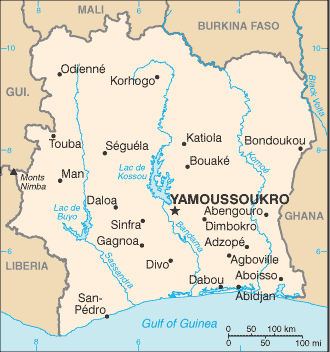Ivory Coast: Hundreds Killed in a Western Town (Nossiter)
 Adam Nossiter reports for The New York Times:
Adam Nossiter reports for The New York Times:
As rebels swept across Ivory Coast in a rapid advance last week to oust the nation’s strongman, Laurent Gbagbo, hundreds of people were killed in a single town, the United Nations and aid groups said Saturday, in the worst episode of violence during the four-month political crisis that has plunged the country back into civil war.
The exact number of dead was unclear. The United Nations said that 330 people had been killed, while aid organizations put the death toll as high as 1,000. It was also uncertain how many were civilians, and how many were combatants, but Caritas, a Catholic charity whose staff members visited the town, Duékoué, in western Ivory Coast, called it a “massacre.”
The “town was full of bodies,” said Patrick Nicholson, a spokesman for the charity. “They saw bodies in the city, in the bush, mass graves.”
Humanitarian workers did not say who was responsible. But the United Nations said that more than 100 had been killed by Mr. Gbagbo’s fighters, while about 200 had been killed by forces loyal to his rival, Alassane Ouattara, the man recognized by the United Nations, the African Union and other international bodies as the winner of the presidential election last year.
Mr. Ouattara’s government issued a statement denying responsibility for atrocities in any part of the country, saying its forces had discovered mass graves in other towns that were the result of massacres by Mr. Gbagbo’s forces.
But the killings could call into question how much control Mr. Ouattara has over his forces. If further investigation proved their involvement in civilian deaths, it could tarnish Mr. Ouattara’s reputation overseas, where he is perceived to hold the high moral ground in the standoff with Mr. Gbagbo.
Throughout most of the crisis, civilian killings have come largely at the hands of Mr. Gbagbo’s forces, eliciting threats of criminal charges from international prosecutors. Human rights groups have also accused forces loyal to Mr. Ouattara of some extrajudicial killings, but neither side has been implicated in a single event close to this scale. The United Nations had previously estimated that a total of about 500 people had been killed in the crisis, over four months of tensions and sporadic violence.
Many of Mr. Ouattara’s fighters are former rebels from a 2002 uprising that divided the country in half, and they have come under his banner only recently. The rebels have a history of human rights abuses and had stayed mainly on the sidelines of the political crisis.
Duékoué is one of the strategic towns in the country’s cocoa-growing region they seized last week. A team from the International Committee of the Red Cross “saw a very large number of bodies” there, said a spokeswoman, Dorothea Krimitsas.
“They were shocked by the scale of it,” she said. “We don’t have exact information as to who is behind this. There were at least 800.”
The conflict between Mr. Ouattara and Mr. Gbagbo has unleashed longstanding ethnic rivalries, particularly in the lawless western regions. The Red Cross said the large number of dead it saw in the town on Thursday and Friday were apparently victims of “intercommunal violence.” But it did not assign responsibility for the killings.
With Mr. Gbagbo refusing to step down — despite international condemnation, sanctions and a collapsing economy — the rebels pushed across the country in a rapid sweep last week, advancing all the way to encircle the presidential palace and Mr. Gbagbo’s residence in the nation’s main city, Abidjan.
United Nations peacekeepers are stationed at Duékoué, but it was unclear what knowledge, if any, their base might have had about the mass deaths.

 Sunday, April 3, 2011 at 8:22
Sunday, April 3, 2011 at 8:22
Reader Comments